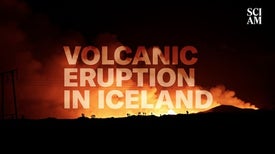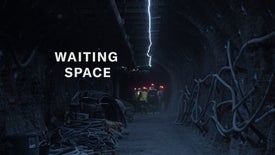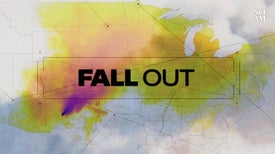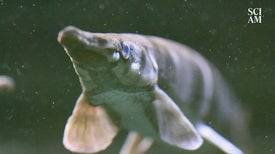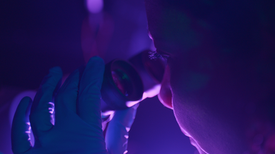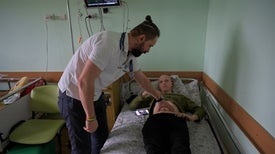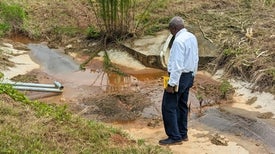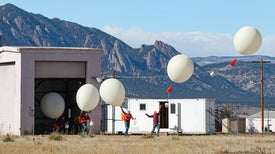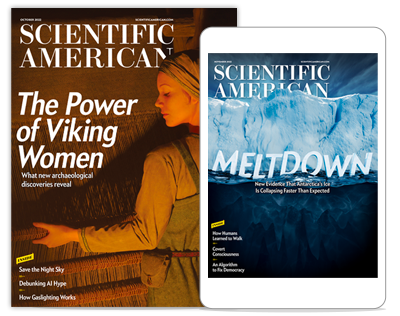After COVID devastated Kenya, oxygen prices began to skyrocket, causing people to lose their life. Ruth Wambui, a nurse-entrepreneur, set out to bridge the oxygen gap in the country.
[NEWS CLIPPING] For most of us breathing is the easiest thing to do because oxygen is naturally available in the air. An oxygen crisis in the country continues to rise and patients are losing their lives while in search of this precious commodity. Oxygen is an expensive luxury. Health Minister, Mutahi Kagwe, has reported low oxygen capacity in the country, due to the rising number of patients in need of the commodity.
[NEWS CLIPPING] Why is the government not taking the oxygen crisis as something that needs to be addressed?
RUTH WAMBUI My name is Ruth Wambui Njuguna. I am a nurse entrepreneur. I am a mother of three children. I am also married. I've been married for the last almost 23 years. And I've also practiced as a nurse for the last 23 years.
RUTH WAMBUI I was born and raised in a small village in Nakuru County. It's called Subukia. My father was a businessman, a shopkeeper, and my mum was a farmer, what you would actually call a peasant farmer.
MATHEW NJUGUNA Ruth was born in 1979. By the time she got to a year old, she could speak. She grew up so fast and was quite intelligent.
TABITHA NJUGUNA Even in her normal behavior as a child, she imitated the lives of doctors. Everytime we went to hospital, she would always say ”One day mum, I will wear these clothes. These nurses clothes and cap, I will wear them.”
RUTH WAMBUI Topcare, as the name would sound is really a place that gives top quality care. We believe we are supposed to impact the world, and that’s my husband and I, we are the founders of Topcare.
RUTH WAMBUI Oxygen is really a necessary thing and we may not know about it because right now it's free. We are breathing it. When it gets to a point where your body actually is not able to do what it should do, and then you need to get support, what we call oxygen therapy and you can't get it. There is nothing as devastating as that.
RUTH WAMBUI I will say at some point when I was doing my pediatric experience, there was this child who actually had respiratory distress and we were really trying to run around helter skelter with the nurse that was on duty then to try and get oxygen. We had a cylinder, but we actually did not even have the accessories and I remember the nurse trying to see if there's a way a tube, would actually work on that child. And that was really a sad moment because it's one thing to lose a child. It's also another thing to lose a child, but thinking maybe oxygen would have saved them.
RUTH WAMBUI Then came the issue of COVID.
[NEWS CLIPPING] Fellow Kenyans, I want to inform you that the Ministry of Health has confirmed the first Corona virus case in Kenya.
[NEWS CLIPPING] But now the country is facing a crisis as oxygen cylinders go missing, straining hospitals capacity to provide this life saving gas, as demand for oxygen grows.
RUTH WAMBUI Both my parents actually contracted COVID, and I remember getting calls. Dad is unwell and is not breathing right. So I thank God for the Subukia (Nakuru) facility because at least we had one cylinder of oxygen and that's where he started and was able to be transferred to a facility that had oxygen.
RUTH WAMBUI Like two days or so later, my mom was not so well. I called the facility. I called and told them to make sure we have a standby oxygen. So we actually were able to give my mum oxygen.
RUTH WAMBUI So I paused to really think and just really see how we can lose lives. Just because of lack of such an essential commodity. So I had no doubt that this is one thing I needed to pursue.
RUTH WAMBUI We partnered with Oxygen Hub to bridge the existing gap in oxygen supply in facilities. Then statistics say just about 20% or less of the oxygen needs were being met around that time. What they were doing buys into the dream or what was also doing, which is running or ensuring everybody gets quality, affordable health care. And so Oxygen Hub came in and was able to source the plant, was also able to install and give us some technical advice, also support in terms of trainings and policy making.
RUTH WAMBUI Our first duty is to bridge the gap so we ensure that we deliver that at your doorstep.
MOSES NAIGUNA The prices are affordable, they are reliable and any time we need them, they are accessible.
AHMED AKBAR This oxygen is very useful to have at home. Otherwise if we don't have it at home them we have to start going to the hospital or maybe call an ambulance. But by the time we call the ambulance she gets very low, very down because of her breathing. So this oxygen helps a lot.
RUTH WAMBUI Our first duty is to bridge the gap so we ensure that we deliver that at your doorstep. Quality for all. Please underline all. For me, if I were to think about a perfect world, it's a world where somebody would come from Subukia, a peasant farmer and is able to access the quality of care where somebody else who is let’s say a civil servant or somebody having a post in the government or whatever, you know, like there is equality. You know, it's universal, like that kind of a thing. For me, that's a perfect world.
That's a perfect world.
[This is a short film for Scientific American by Wanjiru Njoroge and Brian Obra. It’s a product of the Solutions Storytelling Project, an initiative from the Video Consortium that is supported by the Skoll Foundation.]
